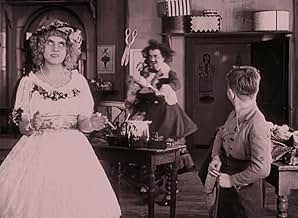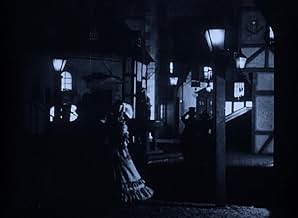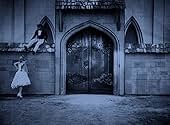NOTE IMDb
7,4/10
2,6 k
MA NOTE
Ajouter une intrigue dans votre langueForced into marriage by his uncle, a man decides to fool him by marrying a life-like mechanical doll instead.Forced into marriage by his uncle, a man decides to fool him by marrying a life-like mechanical doll instead.Forced into marriage by his uncle, a man decides to fool him by marrying a life-like mechanical doll instead.
- Réalisation
- Scénario
- Casting principal
Ernst Lubitsch
- Director in Prologue
- (non crédité)
Avis à la une
I caught this on TCM, it is a completely captivating and delightful experience for all ages, so many layers in this story. Cannot recommend it enough for its period charm and generally kookiness.
However, the cast list here on IMDB is a mess due to faulty translations. "Dessen Frau" means "His Wife", and refers to Baron Chanterelle (chanterelles are a group of mushrooms, much eaten in Germany in late summer/autumn.) Similarly, "His Daughter" (Ossi, or The Doll) again refers to the Baron as her father. "The Briar" (!) should, I think, be The Friar; only in the film he is in fact the Abbot of the monastery, not merely a Brother. Wikipedia gets it all correct on its page about this film.
However, the cast list here on IMDB is a mess due to faulty translations. "Dessen Frau" means "His Wife", and refers to Baron Chanterelle (chanterelles are a group of mushrooms, much eaten in Germany in late summer/autumn.) Similarly, "His Daughter" (Ossi, or The Doll) again refers to the Baron as her father. "The Briar" (!) should, I think, be The Friar; only in the film he is in fact the Abbot of the monastery, not merely a Brother. Wikipedia gets it all correct on its page about this film.
Because the Baron of Chanterelle wants to preserve his family line, he forces his timid nephew Lancelot to choose one of the village maidens to wed. Lancelot flees to a monastery to escape the forty eager maidens. When the gluttonous monks discover that the Baron is offering a large sum for the marriage, they suggest Lancelot marry a mechanical doll instead.
I absolutely love how this was put on as a mixture between a play and a film. Some of the sets (such as inside the castle) seem quite elaborate, while other things (the trees and horses) smack of a high school production. But not in a bad way -- there is a certain charm to how this story unfolded. Add to that the wild hair and outfit of the puppet master (a precursor to Willy Wonda) and you have a great looking film.
Something could be said about the interaction between people and robots, and at what point are robots so lifelike that the line between human and non-human is all too fuzzy. But this is a light-hearted film and I will not get too serious here.
I absolutely love how this was put on as a mixture between a play and a film. Some of the sets (such as inside the castle) seem quite elaborate, while other things (the trees and horses) smack of a high school production. But not in a bad way -- there is a certain charm to how this story unfolded. Add to that the wild hair and outfit of the puppet master (a precursor to Willy Wonda) and you have a great looking film.
Something could be said about the interaction between people and robots, and at what point are robots so lifelike that the line between human and non-human is all too fuzzy. But this is a light-hearted film and I will not get too serious here.
"The Doll" is a delightful feature--the best I've seen of director Ernst Lubitsch's German films. The deliberately artificial and often theatrical settings--flat backdrops, fake trees and people in horse costumes included--by Kurt Richter saliently add to the picture's enchantment and fairytale-like narrative. "The Doll" is similar in this approach to Maurice Tourneur's 1918 films "The Blue Bird" and "Prunella." Like "The Blue Bird," "The Doll" has a few moments that seem reminiscent of the feéries of early-cinema pioneer Georges Méliès, such as the Moon's facial expressions and the stop-motion animation to change the doll maker's hair. Highly-artificial theatricality was also adopted for "The Cabinet of Dr. Caligari" (1920), although in a very different way. Lubitsch begins the film well by appearing in front of the camera to introduce and arrange the mise-en-scène in miniature--a scene that then fades to the actual set and beginning of the story proper.
In it, the baron's nephew doesn't want to marry a woman, so he purchases what he believes is a life-size doll to be his wife. Meanwhile, a real woman, the doll maker's daughter, is pretending to be that doll to hide that the doll maker's apprentice broke the doll that was based on her appearance. So, the nephew thinks he's fooling everyone, when he's the one being fooled. It's a simple narrative, briskly plotted, and very well enacted. The inherent sexism isn't lost on Lubitsch either, as a humorous advertisement offers the doll maker's product to widowers and misogynists alike. Additionally, there are a few light sex jokes throughout. Ossi Oswalda is wonderful, cute and funny, with her various expressions and movements, including the dancing, as she plays the character masquerading as a lifeless doll. Her performance significantly helps make this photoplay entertaining. The slapstick and subplot antics between the wacky-looking doll maker and his young apprentice are even amusing and appreciated.
Dancing and a comedy chase make their way into this and other Lubitsch films. The themes of mistaken identity or masquerading as acting and doubles also underlie the humor of several Lubitsch comedies, in Germany and America. His three earliest comedies that I've seen ("The Merry Jail," "I Don't Want to Be a Man" and "The Oyster Princess") all play with these ideas in different and self-reflexive ways, with characters pretending to be someone else. The girl isn't only doubled as a doll; her image is literally doubled photographically during a dream scene. Moreover, the theme of fakery extends further in "The Doll": the dolls are fake, a real woman fakes being one of them, which is supported by the fake appearance of much of the film's production design. The entire production coalesces to firmly establish the film's world as fantasy. The sets and designs of Lubitsch's German films seem to have always been impressive, but in some of them, it feels that they overwhelm their plays, or that the narratives and characters were never equal to the grand décors, but in "The Doll," it all fits together.
In it, the baron's nephew doesn't want to marry a woman, so he purchases what he believes is a life-size doll to be his wife. Meanwhile, a real woman, the doll maker's daughter, is pretending to be that doll to hide that the doll maker's apprentice broke the doll that was based on her appearance. So, the nephew thinks he's fooling everyone, when he's the one being fooled. It's a simple narrative, briskly plotted, and very well enacted. The inherent sexism isn't lost on Lubitsch either, as a humorous advertisement offers the doll maker's product to widowers and misogynists alike. Additionally, there are a few light sex jokes throughout. Ossi Oswalda is wonderful, cute and funny, with her various expressions and movements, including the dancing, as she plays the character masquerading as a lifeless doll. Her performance significantly helps make this photoplay entertaining. The slapstick and subplot antics between the wacky-looking doll maker and his young apprentice are even amusing and appreciated.
Dancing and a comedy chase make their way into this and other Lubitsch films. The themes of mistaken identity or masquerading as acting and doubles also underlie the humor of several Lubitsch comedies, in Germany and America. His three earliest comedies that I've seen ("The Merry Jail," "I Don't Want to Be a Man" and "The Oyster Princess") all play with these ideas in different and self-reflexive ways, with characters pretending to be someone else. The girl isn't only doubled as a doll; her image is literally doubled photographically during a dream scene. Moreover, the theme of fakery extends further in "The Doll": the dolls are fake, a real woman fakes being one of them, which is supported by the fake appearance of much of the film's production design. The entire production coalesces to firmly establish the film's world as fantasy. The sets and designs of Lubitsch's German films seem to have always been impressive, but in some of them, it feels that they overwhelm their plays, or that the narratives and characters were never equal to the grand décors, but in "The Doll," it all fits together.
"Die Puppe" aka "The Doll" ranks with "The Oyster Princess" as perhaps Lubitsch's most sublime film made during his German period. Both films are superior in many respects to the well-known but pallid historical drama, "Madame duBarry" aka "Passion" (also made in 1919). Lubitsch himself felt that way. In a letter he once submitted to his biographer Herman G. Weinberg, Lubitsch considered "Die Puppe" and "Oyster Princess" as his most outstanding comedies produced in Germany before he departed for Hollywood to make "Rosita".
An early, entrancing example of what Lubitsch would become years later, "Die Puppe" is a supremely funny and delightful silent burlesque, filled with the master's light, witty, and graceful touch. The setting is frothy and artificial and it anticipates Lubitsch's enchanting fairy tale musicals of the sound era.
"Die Puppe" is introduced by Lubitsch himself with an artificial cardboard. It is a fairy tale about of a young prince named Lancelot(Hermann Thimig) who flees from his uncle Baron von Chanterelle(Max Kronert) to avoid a marriage. He settles in a monastery. There, he meets several monks who persuade him to marry a human-like mechanical doll and give them his uncle's dowry. The doll-maker Hilarius (Victor Janson) agrees to Lancelot's interest in his newest doll, an exact replica of Hilarius' daughter Ossi (played by Ossi Oswalda herself). But there is a problem: The doll-maker's young apprentice (Gerhard Ritterband) accidentally breaks the arm of the doll and now it is up to Hilarius' daughter Ossi to impersonate the doll in order to cover it up. Lancelot takes the doll/Ossi to his uncle's castle, where some of Lubitsch's most inventive gags occur as Lancelot mistakes real Ossi for the doll. He actually falls in love with the doll/Ossi. And the wedding scenes alone are some of the funniest moments ever filmed.
If you are a fan of Lubitsch, "Die Puppe" is an essential viewing.
An early, entrancing example of what Lubitsch would become years later, "Die Puppe" is a supremely funny and delightful silent burlesque, filled with the master's light, witty, and graceful touch. The setting is frothy and artificial and it anticipates Lubitsch's enchanting fairy tale musicals of the sound era.
"Die Puppe" is introduced by Lubitsch himself with an artificial cardboard. It is a fairy tale about of a young prince named Lancelot(Hermann Thimig) who flees from his uncle Baron von Chanterelle(Max Kronert) to avoid a marriage. He settles in a monastery. There, he meets several monks who persuade him to marry a human-like mechanical doll and give them his uncle's dowry. The doll-maker Hilarius (Victor Janson) agrees to Lancelot's interest in his newest doll, an exact replica of Hilarius' daughter Ossi (played by Ossi Oswalda herself). But there is a problem: The doll-maker's young apprentice (Gerhard Ritterband) accidentally breaks the arm of the doll and now it is up to Hilarius' daughter Ossi to impersonate the doll in order to cover it up. Lancelot takes the doll/Ossi to his uncle's castle, where some of Lubitsch's most inventive gags occur as Lancelot mistakes real Ossi for the doll. He actually falls in love with the doll/Ossi. And the wedding scenes alone are some of the funniest moments ever filmed.
If you are a fan of Lubitsch, "Die Puppe" is an essential viewing.
This comedy from the hands of Ernst Lubitsch in 1919 is a joyride through a number of imaginative sets and situations. Even though its artificiality if ever apparent, the movie makes it work by playing with the costumes and sets, to create a whimsical world where everything can happen.
Like other Lubitsch films the plot of this is build upon similar themes such as facade and identity. Although not my favourite of Lubitsch's films it hold a place in the top five. This movie is assured to put a smile on your face the whole way through, driven by Lubitsch's at times expressive directing.
Like other Lubitsch films the plot of this is build upon similar themes such as facade and identity. Although not my favourite of Lubitsch's films it hold a place in the top five. This movie is assured to put a smile on your face the whole way through, driven by Lubitsch's at times expressive directing.
Le saviez-vous
- AnecdotesAt one point Lancelot takes a heart out of the leg of his pants. This is an allusion to the German expression 'Das Herz ist mir in die Hose gerutscht' (my heart slid into my pants) which is equivalent to 'to have one's heart in one's boots'.
- GaffesLancelot shouts his alarm to a monk that he is being pursued by "40 women". However, about 20 women are seen on screen.
He says this because the butler earlier had announced "Forty women at the door!" It's an estimate as it's doubtful the butler made an individual count. Also, there is no "requirement" that all referenced individuals must appear on screen.
- Citations
Baron von Chanterelle: [on Lancelot's wedding night] Do you need any more pieces of advice?
Lancelot: No thanks, I have an instruction manual.
- ConnexionsFeatured in Loin de Hollywood - L'art européen du cinéma muet (1995)
Meilleurs choix
Connectez-vous pour évaluer et suivre la liste de favoris afin de recevoir des recommandations personnalisées
- How long is The Doll?Alimenté par Alexa
Détails
- Durée1 heure 6 minutes
- Mixage
- Rapport de forme
- 1.33 : 1
Contribuer à cette page
Suggérer une modification ou ajouter du contenu manquant



























